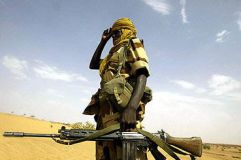Darfur situation becoming increasingly hostile – aid workers
Dec 8, 2005 (NAIROBI) — The humanitarian environment in the western Sudanese region of Darfur is becoming increasingly hostile and clashes between various groups continue to flare up, aid workers warned.
 “There has been a huge increase in the number of attacks and robberies [on humanitarian workers],” said Mike McDonagh, senior humanitarian affairs officer at the UN Office for the Coordination of Humanitarian Affairs (OCHA) in Khartoum, on Thursday.
“There has been a huge increase in the number of attacks and robberies [on humanitarian workers],” said Mike McDonagh, senior humanitarian affairs officer at the UN Office for the Coordination of Humanitarian Affairs (OCHA) in Khartoum, on Thursday.
“Harassment is too weak a term,” he added. “The physical danger aid workers have been exposed to over the last four months is a huge concern. We are very lucky that none of our staff has been killed so far.”
On Saturday, Sudanese Armed Forces (SAF) and militia reportedly jointly attacked the villages of Hemmeda, Um Boru and Koka in the Um Nkunya area, approximately 40 km northeast of Nyala, the capital of South Darfur, the UN Mission in Sudan (UNMIS) reported. The fighting resulted in an unknown number of civilian casualties and displaced about 7,000 people.
“The United Nations is concerned that the parties continue to violate the ceasefire agreement in what seems to be a resumption of the vicious circle of attacks and retaliation that we witnessed in earlier months,” Radhia Achouri, UNMIS spokeswoman, told reporters in Khartoum on Wednesday.
According to reports, the attack on Saturday had been launched against the rebel Sudan Liberation Movement/Army (SLM/A) is the area. In apparent retaliation the following day, the SLM/A attacked Donkey Dereisa, 60 km south of Nyala.
Another attack occurred in West Darfur on Tuesday when Arab militia raided the town of Congo Harasa. They destroyed all the wells that had been constructed by the humanitarian workers to provide water to the local population.
“The UN condemns these attacks that targeted the very livelihood of the people,” Achouri said.
The ongoing deliberate destruction of farmland and crops was negatively affecting the optimistic agricultural output expected for this season, Achouri added. Redisplacements of large groups of civilians to settlements for internally displaced persons (IDPs) or to the outskirts of towns had also continued throughout Darfur.
According to the Geneva Conventions, destroying or rendering useless items essential to the survival of civilian populations is a war crime.
Aid workers in the region had also faced increased violence, threats, beatings and harassment, both within and outside the camps, according to sources in Darfur.
On 5 December, 13 international NGO staff members in West Darfur were relocated with an African Union (AU) escort from Silea to the region’s capital, Geneina, due to insecurity in the area.
Insecurity also forced the AU to airlift three international NGO staff from Kulbus to El Fasher, the capital of North Darfur State. Some local personnel remained behind to provide essential services.
On 4 December, an international NGO compound was caught in the crossfire when fighting broke out between rebel groups and government forces near Masteri. A stray bullet hit a guard in the stomach.
On 1 December, two unidentified gunmen shot and killed a Sudanese driver working for the Sudanese Red Crescent Society in the organisation’s premises in Abu Shouk IDP camp on the outskirts of El Fasher.
“The security situation in Abu Shouk is deteriorating each day,” said a local source. “IDPs are reporting continuous military presence inside the camps during the nights with threats, detentions, harassment to the civil population and shootings.”
Tension had also risen in IDP camps across Darfur due to the proliferation of people posing as community leaders and presenting inflated numbers of newly arrived IDPs to demand food and other relief items.
“They are not just businessmen – they are a real mafia. They sold around 12,000 rations of food in front of our noses,” one aid worker said.
“This business is a time bomb for the stability of the camp,” he added. “The [genuine community] leaders that try to collaborate [with us] are exhausted and very scared. All of us have been threatened many times.”
The Darfur conflict erupted in February 2003 when the two main rebel groups, the SLM/A and the Justice and Equality Movement, took up arms to fight what they called the discrimination and oppression of the region by the Sudanese government.
The government is accused of unleashing militia – known as the Janjawid – on civilians in an attempt to quash the rebellion. According to the UN, the conflict continues to affect some 3.4 million people, of whom 1.8 million are IDPs and 200,000 have fled to neighbouring Chad.
(IRIN)
